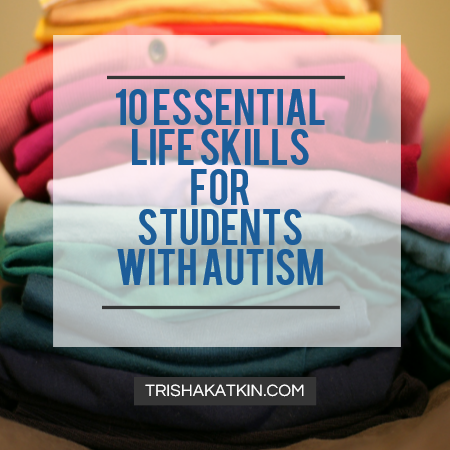Life skills are vital for everyone. These are the important life lessons that teach a child how to be independent. For students with autism, these skills are invaluable. Autistic students may not acquire basic life skills passively. They need a more direct route to be taught life skills. For many students, learning life skills will be more important than the dreaded common core.
- Safety Skills
Safety skills include rudimentary understandings of impending danger. Some children with autism do not understand that they shouldn’t run into a street or go off with a stranger. These are VERY important things for a student to learn. Safety skills include understanding of safety signs such as stop signs and street lights, but also what to do in an emergency.
In order for a student to be independent in the long term, they must know how to keep themselves safe. Staying indoors during a thunderstorm, calling 911 in an emergency, and how to properly shut off the oven or stove are just a few of the safety skills that a student would need to know before true independence.
Where to start? Take it slow. Start where the student is at. Teach safety awareness in a variety of settings.
At recess?
-Teach the student how to stay safe maneuvering around the playground equipment or how to swing without falling off.
In the classroom?
-Teach how to sit properly in a chair, not to rock back, and not to climb on desks or tables.
In the hall?
-Practice walking calmly, with hands by the side, and a quiet mouth.
Taking a walk?
-Practice learning the safety signs such as stop or turn it into a game by playing “Red Light, Green Light.”
- Communication
For me, I cannot imagine not being able to communicate. The frustration, the anger, and the yearn to be understood would otherwise consume me. Providing your students with a means of communication is critical. Find a communication tool that works for your student and is on their level. This can be gesturing to a desired object, a vocalization, use of PECs, or a AAC device. Start slow and work with the most important things to your student. If it is motivating to them, it is more likely to be communicated to you. Be open and discerning. Be observant.
- Self-Regulation
Self-regulation is tough. It is the idea that a student check in with themselves and see where they are at. It’s the idea that a student can think about one’s thoughts and understand how to cope with overwhelming situations and emotions. It’s sometimes called meta-cognition and is something that many neurotypical adults have a hard time with. Believe me, if you sat me in front of a plate of nachos and told me I had to wait to eat them, I wouldn’t last but 30 seconds. Teach the art of self-control. Help your students by teaching emotions and coping mechanisms directly. Discrete trial sessions are a good time to introduce new materials that you can then generalize to the rest of the day. Social stories are a perfect way to teach self-regulation skills throughout the day or as a group during morning meeting. If you need help getting started with social stories, check out my FREE Course HERE!
- Health
Health life skills include learning how to brush one’s teeth and hair and know how to follow through and complete a bathroom routine. This includes helping your student create healthy habits such as teaching them nutrition and healthy eating. The importance of exercise also falls into this category. Facilitate this by working in regular exercise into your day. Find time for stretching in the morning, yoga in the afternoon, or extra walks throughout the day. Exercise is fantastic for reinvigorating the body and mind. It’s also a nice way to take a break after a hard task. Make exercise fun by finding games and movement activities that your students like. Other health habits include bathing, clipping nails, and remembering to use soap.
- Self-Advocacy
Learning how to keep one’s body healthy is important, but also teaching what to do when one’s body is not healthy is another thing. You must teach both sides of this coin. Teaching self-advocacy will do just that. A student needs to know how to express what they need and when. The ability to ask someone for assistance is a necessary life skill. Help your students learn how to ask for help when they need it. Learning how to ask a teacher for help will be invaluable to them in the future when they are presented in situations that they be unaccustomed to.
- Independence
Becoming independent is the hope and dream for many parents and individuals with autism. Becoming independent includes activities of daily living. This means one’s ability to prepare, cook and feed one’s self, but also aspects such as washing, drying and folding laundry. Simple tasks such as sweeping or vacuuming the floor or folding small towels is a great place to start.
Adding jobs to your classroom is a great place to start. Practicing running the lunch choices down to the office or wiping down the desks at the end of the day are perfect options for integrating these skills.
- Self-Esteem
Self-esteem is the way your student views him or herself. It is important to foster self-esteem with your students in order to prevent shut down. Show respect for your students and in return, they will for you. Build self-esteem by using a student’s natural interests to motivate them, encourage along the way, and build trust. If you need help building self-esteem in your students, read my post, 10 Ways to Increase Self-Esteem in Your Students with Autism.
- Time-management
Executive functioning skills are typically hard for students with autism. Time management is one of these skills. The idea of breaking down a task, learning priorities and estimating how long a task may take is a hard one. Practice time-management skills by breaking down tasks for your student. As your students learn routines, their time-management skills will increase. As they become better at following certain routines you can teach them how to estimate how long a task will take them and practice breaking down easy tasks.
You could even double-dip a bit here. Tackle time-management and some independence skills by practicing making simple dishes. You could have your student practice breaking down the task of making a sandwich, trail mix, or some other small snack or meal.
- Money management
Understanding the basics of money management is important in everyday life skills. This includes paying bills, balancing checkbooks, and clipping coupons. Need ideas on where to start? Turn your math activities into life skills activities. Practice having a budget, paying for pretend bills or using coupons. In the long-term, a student will need to have these skills to buy their own groceries or pay their own rent.
- Decision-Making Skills
Becoming independent includes the ability to make decisions. We make hundreds of decisions a day. From simple to complex, decision making is something everyone does. Some students with autism have a hard time with decision making as it requires a multi-step process.
Teach your student how to make good decisions in three steps:
Think about the future. (Will this decision help further your student to their future goals?)
Stick to the facts. (What are the facts surrounding this decision?)
Weigh the pros and cons. (Do the pros outweigh the cons? Choose that one.)
Now you know the skills that need to be taught. But you may be wondering how exactly do I teach them?
Click HERE to get the HOW TO TEACH LIFE SKILLS CHECKLIST
XO,
Trisha
If you enjoyed this post, please visit my site! If you really liked the post, let me know! Zip me an email at theautismquilt@gmail.com, and if you REALLY REALLY like me, let’s join forces! Follow me on Twitter @TRISHAKATKIN, Pinterest, or Facebook. I would love to connect!


